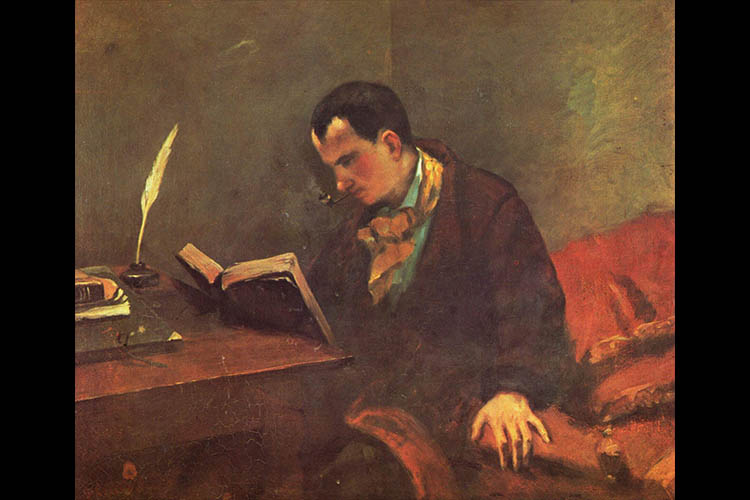Reading:
Graham Fawcett Poetry Talk - Baudelaire
details
6:00 PM
Location
Sladers Yard
West Bay
Dorset DT6 4EL
United Kingdom
Website
https://sladersyard.wordpress.com/2013/08/31/g-fawcett-baudelaire/
Description
A talk focusing on the life and work of Baudelaire.
Graham Fawcett Poetry Talks: Baudelaire
“I was enthralled by Graham Fawcett’s talk on Baudelaire. He painted such vivid pictures with words, that you felt you understood the troubled poet and essayist, and the ‘modern’ influences of Paris in the 1800s that had shaped his life, loves and work. Graham drew the listener into the world of the poet with such skill that, despite no previous knowledge of the subject and the sometimes complex nature of his work, I was totally at ease with Baudelaire’s highly unique style. Several pieces were delivered in full in the original French, allowing the music and rhythm of the lines to be appreciated, before an equally entertaining translation was given. A thoroughly enjoyable evening”. Meg Depla-Lake, at Baudelaire Night in Lewes
“Graham Fawcett has a marvellous knack of opening up a poet’s life and instantly taking you on a colourful voyage through their life and work. Very illuminating indeed..” James Crowden
Baudelaire is an exhilarating poet of the sea-voyage and the love-song who becomes the wandering lone lover of a city, descendant of Homer’s Ulysses, forefather of Joyce’s. To read him is to be instantaneously young, a champion bourgeois-baiting Frenchman, charismatically jaundiced, eloquently susceptible to beauty, isolation, melancholy, the wonders of transgression and the dark side, and hungry to paint the hidden faces of the Paris he famously dubbed a ‘swarming city, city full of dreams’.
Like his English contemporary Dickens, Baudelaire read the city as a Disunited States of mind, where Wilde’s gutter and stars were the two shores of a relentless tide. Baudelaire’s only reality may, as he said, have been in dreams, but these, far from cocooning him in mere fantasy, were the busy breeding-ground of his imagery of sharply recognisable life. If his masterpiece, Les Fleurs du Mal, The Flowers of Evil, published in 1857 is the gutter’s first bible (it profoundly inspired T S Eliot with its insistence on the truth of the unbeautiful), Baudelaire’s voice is at the same time Orphically enchanting and dramatic.
Just how strong an impression the theatrical aspect of worship had made on him as a boy may be gathered from his ambition to be, when he grew up, either the Pope or an actor, because as a poet he does possess both ritual grandeur and a tangible taste for gratifying the audience. Holding a mirror up to what people want and do is the business of his truth-telling; realism and escapism are played off against each other, as we do ourselves, with a restless determination reflected in his poems by a compelling urgency of voice and a wonderfully rhapsodic volatility. He told Flaubert once that he wanted to become ‘a pure will constantly in motion’. He must have succeeded, since when Courbet tried to paint him, he had to admit, “I don’t know how to finish Baudelaire’s portrait. His face changes every day’.
Renowned broadcaster, educator and speaker Graham Fawcett is giving a series of seven lectures at Sladers Yard – the first of which were Pablo Neruda, Geoffrey Chaucer, Byron, Ovid, Aleksandr Pushkin and Emily Dickinson. After Charles Baudelaire (Thursday 5 September), We also look forward to: Read the Japanese Poetry Workshop on Tuesday 10 September and Cavafy day on Tuesday 15 October.
GRAHAM FAWCETT gives courses, seminars, tutorials, lectures, poetry lunches, and other one-day events on reading and writing poetry. He has been a tutor for The Poetry School since 1997, devising and teaching new courses on poetry past and present from around the world. He has written and presented radio programmes about literature and music on BBC Radio 3 for many years.
CREDITS:
Homepage:
Gustave Courbet: Portrait of Charles Baudelaire, 1848-49
Slideshows:
Slide 1: Gustave Courbet: Portrait of Charles Baudelaire, 1848-49
Slide 2: Franz Kupka: The Yellow Scale
